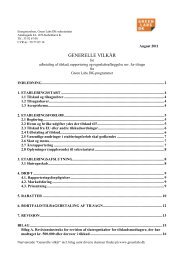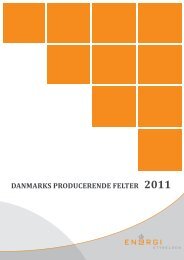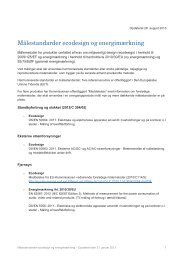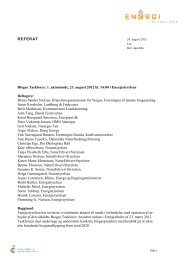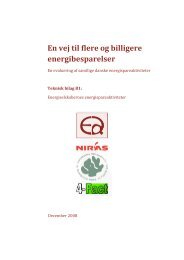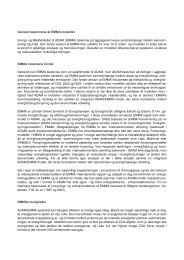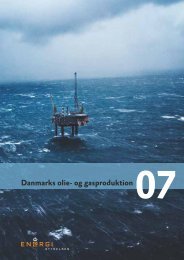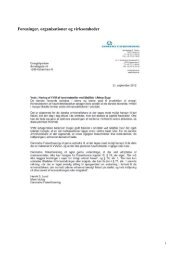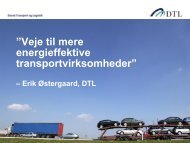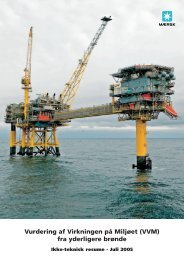Energy Strategy 2050 – from coal, oil and gas
Energy Strategy 2050 – from coal, oil and gas
Energy Strategy 2050 – from coal, oil and gas
Create successful ePaper yourself
Turn your PDF publications into a flip-book with our unique Google optimized e-Paper software.
<strong>Energy</strong> is a prerequisite for a modern society with economic<br />
growth <strong>and</strong> welfare. We take power <strong>and</strong> heating<br />
for granted, just as we take access to clean drinking<br />
water <strong>and</strong> clean air for granted. This has held true for<br />
most of the 20th century, <strong>and</strong> it should to apply for the<br />
21st century.<br />
However, for economic, strategic <strong>and</strong> environmental<br />
reasons, we will have to take a completely fresh look<br />
at the way in which we consume <strong>and</strong> produce energy.<br />
Over the last hundred years, western societies have had<br />
access to plentiful <strong>and</strong> relatively cheap fossil energy. The<br />
next 100 years will bring considerable change, with an<br />
increasing number of people dem<strong>and</strong>ing a share of the<br />
energy, while available fossil fuels become ever scarcer<br />
<strong>and</strong> <strong>oil</strong> resources are concentrated in the h<strong>and</strong>s of just<br />
a few countries. There is also the fact that global climate<br />
problems will require us to burn far less <strong>coal</strong>, <strong>oil</strong> <strong>and</strong> <strong>gas</strong>.<br />
The 21st century will have to be the century in which<br />
we find new solutions to satisfy the dem<strong>and</strong> for energy<br />
services, i.e. lighting, heating, transport, production etc.<br />
With these challenges also come new opportunities for<br />
Denmark, since the majority of countries will be faced<br />
with the same challenges, meaning that there will be a<br />
1973<br />
95% of<br />
Danish energy<br />
consumption<br />
covered by<br />
imported <strong>oil</strong><br />
Oil <strong>and</strong> <strong>gas</strong> <strong>from</strong><br />
the North Sea<br />
Figure 1.1 Phases in the transition of the Danish energy<br />
system<br />
The next 100 years will bring considerable<br />
change, with an increasing number of people<br />
dem<strong>and</strong>ing a share of the energy<br />
1985<br />
Electricity <strong>and</strong><br />
heating <strong>from</strong> <strong>coal</strong><br />
<strong>and</strong> natural <strong>gas</strong><br />
Increased<br />
energy efficiency<br />
considerable growth in the dem<strong>and</strong> for green technologies;<br />
an area in which Danish enterprises excel.<br />
A good foundation<br />
Over a number of years, Denmark has enjoyed high<br />
security of supply with world-class energy efficiency, <strong>and</strong><br />
an increasing share of renewable energy. This is due to<br />
a radical conversion of the Danish energy system since<br />
the first <strong>oil</strong> crisis in 1973. Firstly, considerable energy<br />
efficiency improvements have taken place at companies<br />
<strong>and</strong> in households, <strong>and</strong> energy production has likewise<br />
been made more efficient, for example through the<br />
expansion of district heating <strong>and</strong> combined heat <strong>and</strong><br />
power production (CHP). Secondly, the fuel mix has<br />
changed <strong>from</strong> 95% dependence on imported <strong>oil</strong> to a differentiated<br />
energy supply based on <strong>coal</strong>, <strong>oil</strong>, natural <strong>gas</strong><br />
<strong>and</strong> renewables.<br />
Independence of fossil fuels is to preserve this favourable<br />
situation in a future where Denmark <strong>and</strong> the rest of<br />
the world will experience increasing dem<strong>and</strong> for energy<br />
services, while the production of fossil fuels, especially<br />
<strong>oil</strong> <strong>and</strong> <strong>gas</strong>, will be concentrated in ever fewer countries<br />
<strong>and</strong> regions.<br />
2011<br />
High energy<br />
efficiency<br />
Large share of<br />
renewable energy<br />
Net exporter<br />
of energy<br />
<strong>2050</strong><br />
Denmark is<br />
independent<br />
of fossil fuels<br />
<strong>Energy</strong> <strong>Strategy</strong> <strong>2050</strong> <strong>–</strong> <strong>from</strong> <strong>coal</strong>, <strong>oil</strong> <strong>and</strong> <strong>gas</strong> to green energy.<br />
11



